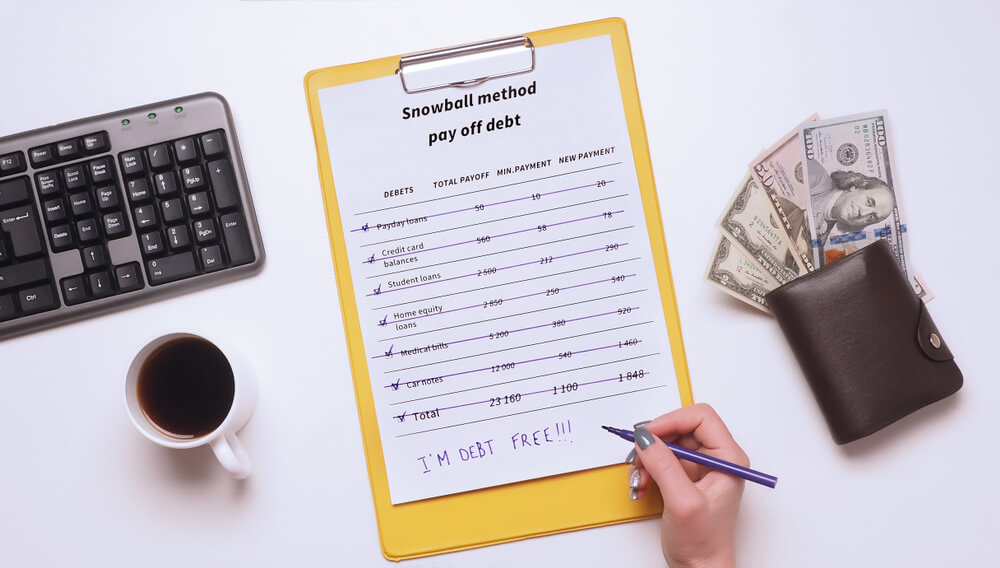
The Debt Snowfall Vs. Debt Avalanche Method: Which One Is Right For You?
Debt snowball and debt avalanche have recently become clear frontrunners among debt payoff methods. While both supporters have their arguments about why one is better than the other, there’s no clear winner in the debt snowball vs debt avalanche debate. Each has its benefits and drawbacks.
Their success depends on the person’s personality, their weaknesses, and what they’re willing to give up during the debt payoff period. We'll dive into the positive reinforcements, which is better for savings, how to choose which is best for you, how to handle debt in the future, and how title pawns could assist you in a financial crunch.
The Debt Snowfall Vs. Debt Avalanche: How To Decide
Deciding between these two debt management strategies can take time, especially if you are facing late fees and high-interest payments. Thus, it is essential to review and analyze the consequences of choosing one method over another. Factors like interest rates, payoff amounts, and your lender's willingness to work with you will influence your choice.
With this in mind, we encourage you to calculate your debt repayment options before making a final decision. Please review each method's pros and cons and select the strategy that aligns with your financial goals for debt relief.
What Are The Pros And Cons Of The Debt Snowball Method?
The debt snowball method works like this: You list all your debt from the smallest to the largest and then put all your extra money towards paying off the smallest while making minimum payments on all the rest. When the smallest debt is paid off, the extra money starts going to the second smallest, and so on.
Advantages Of The Debt Snowfall
The significant upside of this method is that you see a lot of progress in the first few months, knocking out debts and freeing up money to make extra payments on the next ones. The downside is that interest rates don’t play a part in this strategy, so you might need to keep your highest-interest debt at the end of the list.
If you have trouble motivating yourself, are prone to hopelessness, and there’s a chance you may stop debt payoff if any difficulties arise – a debt snowball would work better for you. Seeing results first would motivate you, and if you need to pause the payoff for any reason, who would have higher chances of having already achieved tangible results?
The debt snowball method was the unequivocal leader due to money guru Dave Ramsey’s influence. However, as the community grew, so did the popularity of alternative methods—particularly debt avalanches.
Disadvantages Of The Debt Snowfall
The major weakness of the debt snowball method is that interest on your remaining loans will compound over time. While you focus on paying off your smallest debt first, the other, often much larger debts, will continue to accrue interest.
This is a huge drawback for those concerned about high interest rates. While you may be able to pay off the principal amount on a smaller debt, the larger debt will swell with interest, making it more challenging to repay subsequent debt.
What Are The Strengths And Weaknesses Of The Debt Avalanche?
Advantages Of The Debt Avalanche
The debt avalanche, on the other hand, prioritizes interest rates. You again list all your debts to determine the payoff order—only this time, you list them from the highest interest rates to the smallest. The most significant upside is that you’ll pay less interest on your debt, first knocking off the ones with the highest interest.
If you have better control over your money (and spending habits) and quickly find motivation by crunching numbers and keeping potential financial gain in mind, debt avalanches would work better for you. It may take some time to see tangible results, but the process will become easier after you’ve paid your first debt off and seen how much you saved on interest.

Disadvantages Of The Debt Avalanche
The downside is that it may take some time before you see any debts paid off and free up extra cash to throw at the next one. This method requires you to double down initially and wait until you see any tangible results.
As a result, your credit score will likely stall—or continue to dip—and, most importantly, you may struggle to maintain momentum. Simply put, this method will take much longer to pay off your initial debt. Thus, you may not feel like you're reaching your goals or seeing the positive results of all your perseverance, which may cause you to feel discouraged.
How Title Pawns May Help With Emergency Debt
Some problems may exacerbate and cost you more in the future. It’s all about pros and cons, which may outweigh the cons in time-sensitive situations (health emergencies, urgent repairs, overdue bills). If you risk defaulting on your existing debt or missing several payments, a title pawn might be an option for you to consider.
Title pawns are easy to apply for (all you need is a state-issued ID proving you’re 18+, a car, and its lien-free title in your name) and are accessible to people of all credit and employment situations.
To get started, call your preferred store location or submit an inquiry form for car title pawns online and wait for the store representative to call you to guide you through the rest of the process.
Bring your ID, your car, and your car’s lien-free title to the nearest storefront. The associate will assess everything and determine if you qualify for the loan and its terms. If they decide to approve you, you’ll get the cash you qualified for either the same day or the next business day.
Submit Your Inquiry For Title Pawns Today!
Whatever method you choose to get your financial life back on track, remember that you can deal with the unexpected by resorting to title pawns. You can start today by submitting a short online inquiry for a Georgia title pawn on our website or by calling us directly at 800-514-2274.
Note: The information in this article is only for informational purposes. You should contact your financial advisor about your specific financial situation.
